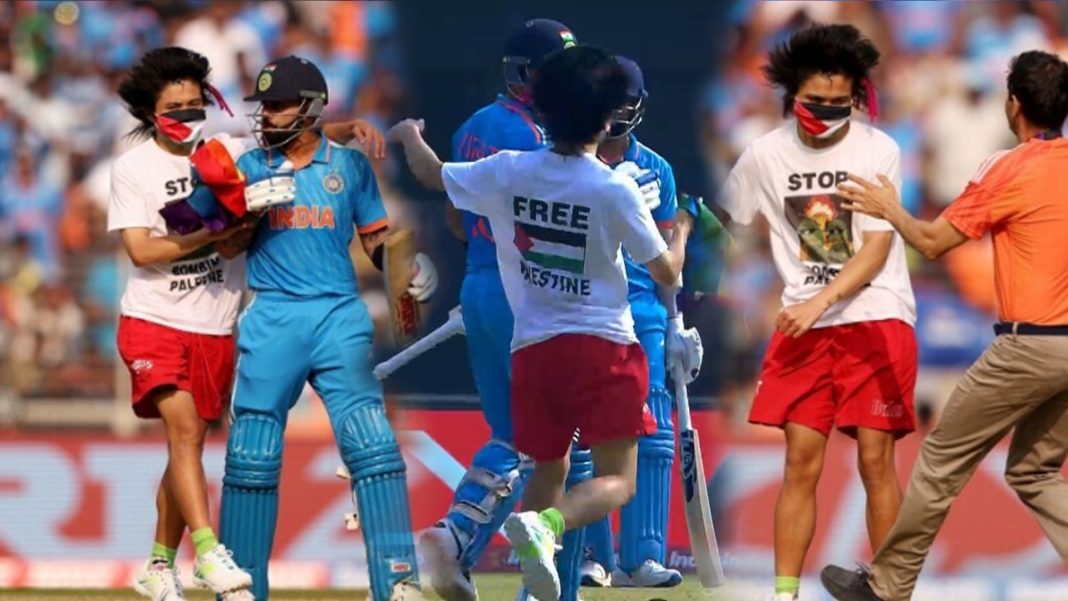Free Palestine
The cricket mega event unfolded with the clash of two global cricket powerhouses. India, boasting one of the world’s largest populations, faced off against Australia in a thrilling encounter at Ahmedabad’s Narendra Modi Stadium. The grandeur of the occasion was further elevated with a colossal audience of around 100,000 fans, including VIPs from showbiz and cricket, creating an electrifying atmosphere.
As the match progressed, an unexpected turn of events unfolded during the game. In a sudden and surprising move, a spectator breached security and sprinted towards the renowned Indian batsman, Virat Kohli, on the Bhaga Bhag Ground. This spontaneous act captured the attention of everyone present and watching worldwide.

The intruder, later identified as Wayne Johnson, seized the opportunity to deliver a poignant message on a global stage. In a bold attempt to shed light on the Israeli atrocities in Palestine, Johnson aimed for a ceasefire and sought to expose the harsh reality of Israel’s actions against the vulnerable, including the elderly, youth, women, and infants. His actions resonated globally, effectively conveying a message that Western media often attempts to suppress.
This incident garnered significant media attention, prompting further exploration into the details of the individual behind this act. Questions arose regarding Johnson’s motives, previous actions, and the circumstances surrounding his sudden appearance on the cricket field.
Cricket World Cup final between Australia and India
The Cricket World Cup final between Australia and India served as the backdrop for this unprecedented incident. The match took place at the Narendra Modi Stadium, the largest stadium globally, where the Indian team batted first, and an overwhelming majority of the 1,31,000 spectators were Indian fans.
The young Palestine supporter breached security, reaching the pitch to embrace Virat Kohli. Viral footage captured the moment, showing Johnson wearing a mask with a demand on his T-shirt: “Stop bombing Palestinians” in English. The images stirred strong reactions on social media, with many commending the act as a brave attempt to highlight the plight of Palestinians.
Contrary to assumptions, this wasn’t Johnson’s first protest on a sports field. Earlier in August, during the FIFA Women’s World Cup final between Spain and England, Johnson intruded onto the field, attempting to approach England’s player Lauren Hemp. On that occasion, he wore a black shirt with messages against Russian President Vladimir Putin and German dictator Adolf Hitler.
As Johnson was taken into custody by HSE officials during the Women’s World Cup incident, he identified himself as a resident of Australia and expressed strong support for Ukraine and opposition to Russian actions in 2022. Notably, he carried a flag with three different colors, sparking speculation about his support for LGBTQ+ rights.
Ahmedabad Police Registered Case
The Ahmedabad police registered a case against Johnson, describing him as a big fan of Virat Kohli who entered the ground to hug him. Despite his arrest, Johnson’s actions drew attention to the Palestinian cause, highlighting the limitations of actions taken by Muslim countries and leaders in this regard.
Johnson’s unconventional protest sparked discussions about the effectiveness of global responses to the Palestinian issue. While some praised his courage, others questioned the appropriateness of his methods and speculated about his broader agenda.
The incident raises broader questions about the international community’s stance on the Israeli-Palestine conflict and the role of activists in drawing attention to human rights abuses. Johnson’s actions, however unconventional, succeeded in amplifying the Palestinian cause on a global stage, surpassing efforts by governments and leaders.
In conclusion, Wayne Johnson’s pitch invasion during the Cricket World Cup final became a symbol of individual activism on a grand scale. Beyond the boundaries of sports, it sparked debates on global issues, ranging from the Israeli-Palestinian conflict to LGBTQ+ rights and activism itself. Whether viewed as a courageous act or an inappropriate disruption, Johnson’s actions undeniably ignited discussions about the effectiveness of traditional diplomatic channels in addressing pressing global concerns.


